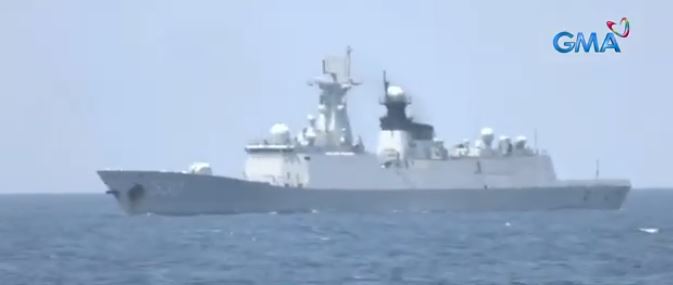Chinese Navy ship shadows PH vessels en route to Pag-asa Island
Published March 22, 2024 12:48am A Chinese Navy ship tailed the Philippine Coast Guard and Bureau of Fisheries and Aquatic Resources (BFAR) vessels en route to Pag-asa Island for a maritime patrol mission and marine scientific research. According to a “24 Oras” report by JP Soriano, the Chinese ship was seen following the Philippine vessels […]


A Chinese Navy ship tailed the Philippine Coast Guard and Bureau of Fisheries and Aquatic Resources (BFAR) vessels en route to Pag-asa Island for a maritime patrol mission and marine scientific research.
According to a “24 Oras” report by JP Soriano, the Chinese ship was seen following the Philippine vessels at around 10:45 a.m. on Tuesday as they sailed to the island.
According to the PCG, both BRP Cabra and BRP Sindangan attempted to contact the ship via radio but received no reply. The Chinese ship then steered in another direction an hour later.
The Philippine vessels arrived at Pag-asa Island at 1 p.m.
Within viewing distance, up to nine Chinese militia vessels and one China Coast Guard ship were observed near Pagasa Island until Wednesday.
The BFAR and marine researchers from the University of the Philippines officially began their joint maritime resource assessment to identify the current state of the Pag-asa Cays following the discovery of dead corals in Sandy Cay Two last year, which were believed to have come from another area.
Experts also said that they planned to study whether the dumping of dead and crushed corals at Sandy Cay Two was done on purpose.
“If it’s true that those were really dumped, it will almost be on the above water already. So actually, it’s only part of the assessment. We will be able to look into that area where there will be possibly some dump[ed] corals that is not from that area, but for now we don’t know,” said Marine Biologist and UP Diliman Professor Jonathan Anticamara.
The marine ecosystem in the Kalayaan Island Group, which includes Pag-asa Island, is a critical biodiversity area, and is crucial for the sustainable supply of fish in the country., thus, the research is important.
“Pag-asa belongs to the Philippines, so regardless whether they’re there or they’re not there we still have the sovereignty rights to do this kind of scientific research that falls within the waters in Pag-asa Island,” said PCG West Philippine Sea spokesperson Commodore Jay Tarriela. —Jiselle Anne Casucian/LDF, GMA Integrated News














